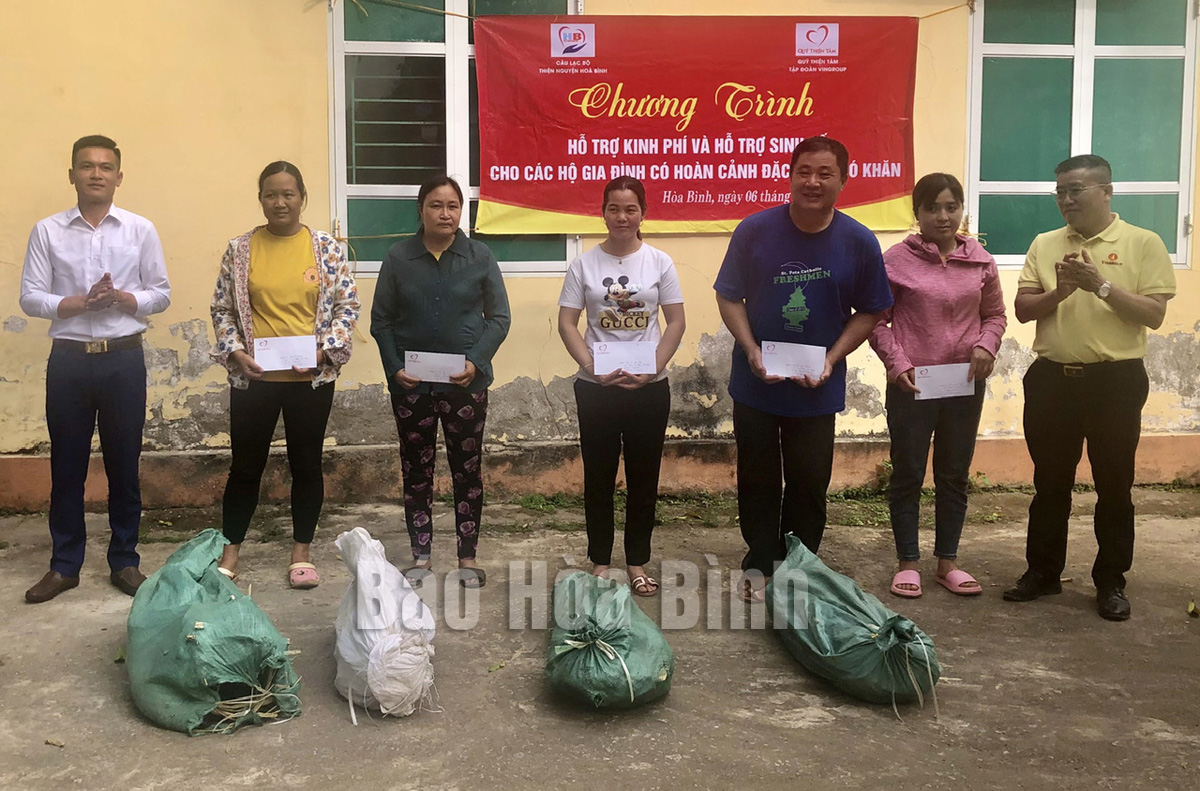
(HBO) – Ethnic households in Mai Chau district have had better livelihoods and incomes thanks to support from local authorities and organisations. In Tong Dau commune, people were given a high-quality rice variety to grow in a pilot area of 4 ha. Seeing positive results of the pilot programme, last year, local farmers expanded the cultivation area using this rice variety.

Meanwhile,
in Cun Pheo commune, the district’s Red Cross Association and other organisation
gave people young animals for raising.
People
in other communes of Mai Ha, Son Thuy, Bao La, and Xam Xoe were also provided
with seeds, young animals, and medicinal plants.
With
funding from the National Target Programme for Socio-economic Development in
Ethnic Minority and Mountainous Areas, Mai Chau district People's Committee
supported each household in Bao hamlet 3 million VND to buy seeds. The
committee coordinated with the GNI organisation to open training courses on
livestock raising techniques, and assisted local residents in the establishment
and operation of the Muong Pa cooperative that specialises in raising and
supplying indigenous pork.
From
17 members, the cooperative now has nearly 50 members. The cooperative’s pork
is sold in Hanoi and neighbouring provinces, bringing stable income to the
cooperative’s members.
According to Ngan Van Toan, deputy head of the district's Department of
Agriculture and Rural Development, programmes and policies to support ethnic
minorities and ethnic minorities have been effectively implemented.
Initial results show that the support helped to increase production value,
income and improve people's living standards.
Ha Van Hai, head of the district's Ethnic Group Affairs Section said that the
district is home to many ethnic groups with the Thai people accounting for
nearly 60% of the district’s population and the Muong 16.6%.
Over
the past time, the district has focused on implementing Resolution No. 03-NQ/TU
of the provincial Party Committee on socio-economic development in ethnic
groups and mountainous areas from 2021 to 2030.
One of
its key tasks is to develop ethnic groups and mountainous areas in association
with economic restructuring, contributing to stabilizing and improving the
people's living standards.
The
Mai Chau district Party Committee has directed agencies, departments, sectors,
and mass organisations to strengthen coordination, and effectively combine
poverty reduction efforts with the implementation of the two national target
programmes on sustainable poverty reduction and new-style rural area
construction.
The
district also supports ethnic group people with social security policies and
vocational training programmes for rural workers.
Such
support not only contributes to improving the lives of ethnic people but also
helps the district to meet the criteria of new-style rural area construction
and step up sustainable poverty reduction in ethnic minority areas.
The
district strives to reduce the poverty rate in ethnic group areas by 3-4% yearly
until 2030./.
The Department of Education and Training of Hoa Binh province held a conference on March 18 to review the performance of the "Safe and Happy School" Project and set out tasks for 2025. The project, funded by the Taiwan Fund for Children and Families (TFCF), aims to create a safe, inclusive, and supportive learning environment for students. The event saw the attendance of representatives from the TFCF and 26 beneficiary schools.
With over 70% of their workers being women, trade unions across industrial parks (IPs) in Hoa Binh have been actively safeguarding their legal rights and interests while implementing initiatives to improve their income and well-being.
In recent years, the Hoa Binh provincial General Hospital has continuously innovated itself and improved the quality of medical services to meet the increasing needs of local people. With substantial investments in infrastructure and modern equipment, along with a team of highly qualified doctors and nurses, the hospital has gradually established itself as one of the leading medical units in the Northwestern region and a trusted destination for healthcare for people inside and outside the province.
From mastering the fundamentals of programming to achieving national recognition, the Programming Club of the Le Van Tam Primary School (STAR LVT28) in Hoa Binh city has made remarkable strides in the field of robotics.
The Ho Chi Minh Communist Youth Union Committee and the Vietnam Youth Federation chapter of Hoa Binh province organised a programme on March 12 to launch the "Digital Literacy" movement and an online quiz on the resolutions of the Vietnam Youth Federation congresses at all levels, as well as the Politburo's Resolution No. 57-NQ/TW on breakthroughs in the development of science, technology, innovation, and national digital transformation.
As climate change grows more unpredictable, the development of production forests has become essential - not just for economic growth, but for safeguarding the environment and maintaining ecosystem balance. By boosting local incomes, curbing natural disasters, preventing soil erosion, and protecting water resources, these forests play a crucial role in sustainable development.



